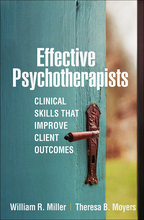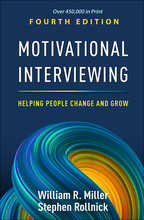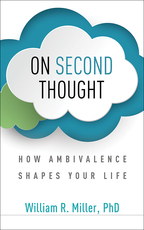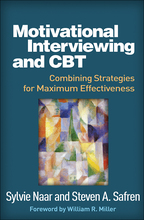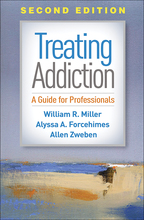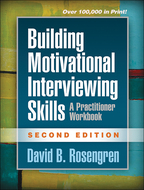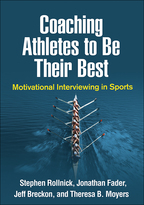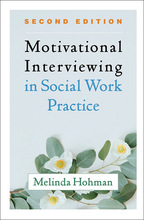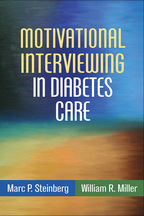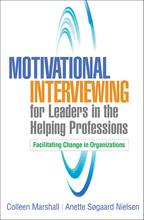Effective Psychotherapists
Clinical Skills That Improve Client Outcomes
William R. Miller and Theresa B. Moyers
HardcoverPaperbacke-bookprint + e-book
Hardcover
orderFebruary 8, 2021
ISBN 9781462545353
Price: $56.00 213 Pages
Size: 6" x 9"
Paperback
orderFebruary 8, 2021
ISBN 9781462546893
Price: $37.00213 Pages
Size: 6" x 9"
e-book
orderJanuary 13, 2021
PDF and Accessible ePub ?
Price: $37.00 213 Pages
ePub is Global Certified Accessible
print + e-book $74.00 $44.40
orderPaperback + e-Book (PDF and Accessible ePub) ?
Price: 213 Pages
ePub is Global Certified Accessible
Buy the audiobook on Audible.com
Read a Q&A with featured author, William R. Miller!
Sign up for emails on upcoming titles on Motivational Approaches (with special discounts)!
Sign up for emails on upcoming titles on Motivational Approaches (with special discounts)!
“This is an excellent and timely book. It is well written, well documented, and very compelling in its message. This book should be required reading in any graduate program that trains therapists.”

—Child and Family Behavior Therapy
“At long last, a book about the most important factor in psychotherapy—the person who delivers the treatment. And who better to author a book about effective psychotherapists than Miller and Moyers? Discussing the most crucial skills that therapists need to learn, this is a clinically focused presentation with a solid scientific basis. To top it off, Miller and Moyers discuss how the skills should be taught and learned through deliberate practice. This is an invaluable read for any practicing therapist and essential for all trainees. It is a solid supplemental text for a counseling theories course or primary text for a course on basic clinical skills.”

—Bruce E. Wampold, PhD, ABPP, Department of Counseling Psychology (Emeritus), University of Wisconsin–Madison
“If I had a dime for every time I heard a therapist say, ‘The relationship is the most important ingredient in psychotherapy,’ I’d be wealthy. Finally, we have a book that translates this old bromide into clinical skills that actually improve client outcomes. If achieving better results is your professional development objective, Effective Psychotherapists provides the roadmap to success.”

—Scott D. Miller, PhD, Director, International Center for Clinical Excellence
“Many practitioners conflate therapeutic effectiveness with a full caseload or professional reputation, but, to paraphrase Forrest Gump, effectiveness is as effectiveness does. Here’s a definitive account on how to do effective therapy. Rooted in clinical science and grounded in the therapeutic relationship, this book demonstrates how you can improve your own relationship competencies and thus your outcomes. Cutting-edge science and application that both Carl Rogers and B. F. Skinner would endorse!”

—John C. Norcross, PhD, ABPP, Distinguished Professor and Chair of Psychology, University of Scranton
“Concise yet thorough, this user-friendly guide will be an excellent primary text for graduate students from multiple disciplines who are learning to be counselors and psychotherapists. Miller and Moyers do a masterful job articulating the essential qualities of the therapist and the critical processes in the therapeutic relationship. This clearly crafted book empowers new behavioral health professionals to master the therapeutic and relationship skills necessary to be effective helpers and healers. It will also serve as a welcome companion for counselors and psychotherapists well into their careers—it offers guidance and pearls of wisdom for collaborating with clients in ways that promote positive change and growth.”

—Nadine J. Kaslow, PhD, ABPP, Department of Psychiatry and Behavioral Sciences, Emory University School of Medicine; past president, American Psychological Association
—Child and Family Behavior Therapy
“At long last, a book about the most important factor in psychotherapy—the person who delivers the treatment. And who better to author a book about effective psychotherapists than Miller and Moyers? Discussing the most crucial skills that therapists need to learn, this is a clinically focused presentation with a solid scientific basis. To top it off, Miller and Moyers discuss how the skills should be taught and learned through deliberate practice. This is an invaluable read for any practicing therapist and essential for all trainees. It is a solid supplemental text for a counseling theories course or primary text for a course on basic clinical skills.”
—Bruce E. Wampold, PhD, ABPP, Department of Counseling Psychology (Emeritus), University of Wisconsin–Madison
“If I had a dime for every time I heard a therapist say, ‘The relationship is the most important ingredient in psychotherapy,’ I’d be wealthy. Finally, we have a book that translates this old bromide into clinical skills that actually improve client outcomes. If achieving better results is your professional development objective, Effective Psychotherapists provides the roadmap to success.”
—Scott D. Miller, PhD, Director, International Center for Clinical Excellence
“Many practitioners conflate therapeutic effectiveness with a full caseload or professional reputation, but, to paraphrase Forrest Gump, effectiveness is as effectiveness does. Here’s a definitive account on how to do effective therapy. Rooted in clinical science and grounded in the therapeutic relationship, this book demonstrates how you can improve your own relationship competencies and thus your outcomes. Cutting-edge science and application that both Carl Rogers and B. F. Skinner would endorse!”
—John C. Norcross, PhD, ABPP, Distinguished Professor and Chair of Psychology, University of Scranton
“Concise yet thorough, this user-friendly guide will be an excellent primary text for graduate students from multiple disciplines who are learning to be counselors and psychotherapists. Miller and Moyers do a masterful job articulating the essential qualities of the therapist and the critical processes in the therapeutic relationship. This clearly crafted book empowers new behavioral health professionals to master the therapeutic and relationship skills necessary to be effective helpers and healers. It will also serve as a welcome companion for counselors and psychotherapists well into their careers—it offers guidance and pearls of wisdom for collaborating with clients in ways that promote positive change and growth.”
—Nadine J. Kaslow, PhD, ABPP, Department of Psychiatry and Behavioral Sciences, Emory University School of Medicine; past president, American Psychological Association

